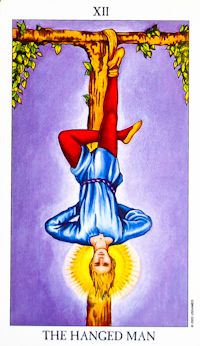 In last week’s blog, The Hanged Man – Change Your Perspective, we talked about slowing down and taking a new perspective. Easier said than done, right? In this week’s post, The Paradox of The Hanged Man, we explore why he shows up now. The enigmatic Hanged Man understands his position is a sacrifice needed in order to move forward. At first glance, he seems so simple, but if you dig a little deeper, you’ll find he’s also complex. There’s something intriguing about this card.
In last week’s blog, The Hanged Man – Change Your Perspective, we talked about slowing down and taking a new perspective. Easier said than done, right? In this week’s post, The Paradox of The Hanged Man, we explore why he shows up now. The enigmatic Hanged Man understands his position is a sacrifice needed in order to move forward. At first glance, he seems so simple, but if you dig a little deeper, you’ll find he’s also complex. There’s something intriguing about this card.
As a seasoned reader, I’m not unfamiliar with the mixed vibe I get from my clients at the sight of his image. It pulls on your curiosity and makes you question/wonder what you are looking at. For some, the image is concerning or dark. I see the card’s essence. This magnetic push and pull brings me to the main lesson—The Hanged Man is a paradox. Let’s define that. Paradox. Noun. A situation, person, or thing that combines contradictory features or qualities.
Why is the Hanged Man a Paradox?
It’s that in the Hanged Man, you control by letting go. You win by surrendering. By standing still, you are able to move forward. The Hanged Man can be a reminder that the best choice may not always be the most obvious one. When you most want to force your will or use a little “extra influence”, that’s when you should walk away. When you most want to take action, that’s when you should wait. And, by making these contradictory/opposite moves, you find what you’re looking for. Paradox. The Hanged Man has you reflecting on why things have turned out this way.
In our long and multi-layered lives, we have all played our part in the drama. Whether this was on the playground during elementary school recess, when competing for a win (sports, debate, committee chair), or trying to get ahead in our job or career. We have all said, done, or played a part that as we look back, we may no longer be so proud of. The Hanged Man is where you begin to see the part that you played or the harm that you’ve done, and are (possibly) ready to start taking responsibility for what happened instead of blaming others. His reality is the result of his past actions. Use this time of reflection/pause/inaction to consider the lesson. To really learn it.
The Hanged Man, the number 12, when added together becomes a three. Three is about growth. Growth in the Hanged Man may be internal but can also play out in real life.
Your Mission This Week:
- Why or how does the paradox of the Hanged Man relate to you?
- What is the benefit of taking an “opposite” action?
- What’s the lesson?







